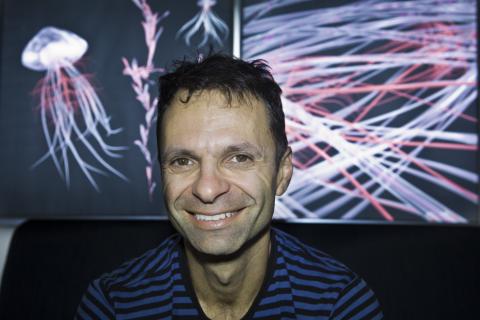Primary supervisor
Alan DorinCo-supervisors
- Assoc. Prof. Adrian Dyer (RMIT)
Research area
Agents and Decision-MakingInsects are vital components of natural and agricultural ecosystems that interact with plants in complex ways. Computer simulations can help us understand these interactions to improve crop production, and to assist us to sustain our natural ecosystems as we change the Earth's climate. This technology is vital to inform our strategies to protect global food supplies and manage our national parks and forests.
Bees, wasps and flies are needed to pollinate our crops and wildflowers. Fruit-flies destroy many crops by laying eggs in the fruit, rendering them unsuitable for human consumption. Western flower thrips are another insect that has the potential to destroy fruit crops, strawberries for instance. Butterflies and moths can be excellent flower pollinators, but their caterpillars can completely eat through young crop plants. Wasps sometimes sting humans, but some species make excellent bio-control agents that hunt for caterpillars on our crops, saving the crop's leaves from being eaten to the stem. The world of plant-insect interactions is complex! How can we predict what will happen to these systems in the future? How can we help make sure they are managed sustainably?
This project will develop individual-based models (also called agent-based models) to simulate insect-plant interactions. These are computer simulations where each individual animal is simulated in detail within a virtual environment. The virtual world runs a little like a computer game, except there are no human players, all the components of the game are computer-controlled by algorithms parameterised from real insect behaviour. Each species has its own perceptual system, cognitive processes, decision-making and learning algorithms. Each individual organism makes decisions on a moment-by-moment basis based on what it sees in the world around it. Each decides on its own goals, and about what it should do to achieve them (e.g. move, turn, eat, go home, explore, fight, mate, communicate etc.). The result is a complex virtual environment that we will use to predict the outcomes of real ecosystem interactions. In this way, we can alter ecosystem conditions to explore the impact on insect/plant interactions.
Using these simulations, we will explore how to improve greenhouse crop production by boosting pollination, enhancing natural bio-control agent behaviour, and suppressing insects pests naturally. This will help us to grow more food, use less chemicals, and reduce our impact on the environment.
#sustainability
Required knowledge
- Computer programming (e.g. C++ Python or other languages)
- An interest (but not necessarily formal qualifications) in ecology, insects, plants, sustainability or food production
- Curiosity is required!
